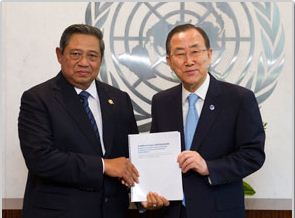Post-2015 Development Agenda: the Devil will be in the Details
By Alexandra Draxler, former UNESCO education specialist.
 The proposals of the High-Level Panel on Post-2015 are now on the table in the form of a report with suggested goals and an outline of possible targets. Reactions have been cautiously positive or positively enthusiastic both on this blog (here and here) and elsewhere (see for example Pauline Rose’s post on EFAGMR, and Allison Anderson and Lauren Greubel’s post for Brookings). While I hate to rain on anyone’s parade, I maintain we need to assume that the devil will be in the details and that it will be the description of the targets and how they will be monitored that will dominate most of the processes.
The proposals of the High-Level Panel on Post-2015 are now on the table in the form of a report with suggested goals and an outline of possible targets. Reactions have been cautiously positive or positively enthusiastic both on this blog (here and here) and elsewhere (see for example Pauline Rose’s post on EFAGMR, and Allison Anderson and Lauren Greubel’s post for Brookings). While I hate to rain on anyone’s parade, I maintain we need to assume that the devil will be in the details and that it will be the description of the targets and how they will be monitored that will dominate most of the processes.
It has become clear since 2000 that whatever the descriptive language of development goals, it is the targets and the ways of measuring those targets that are the most influential drivers of the development goals and of education as part of those goals. The displacement effect of the push for universal primary education following the MDGs has sent ripples through very large numbers of education systems that will last a long time: broad-based hiring of untrained and contract teachers with all its attendant problems, neglect of institution-building, slowing-down of secondary education expansion and quality, and failure to give absolute priority to those most in need.
The day the High-Level Panel released its report, NORRAG was holding a policy seminar on “Education in Conflict Emergencies in the Context of the post-2015 MDG and EFA Agendas”. Our discussion was taking place before we had the report. Many of the concerns we were debating, though, are as valid after the release of the report as before. The hard work of ensuring that the targets suggested adequately address inequality, fragility and local ownership is still to be done.
As the panel’s proposals are fleshed out throughout the next 12 months, those concerned with a rights-based emphasis for education goals and a vision of education as a public good must be watchful. How and by whom will quality be defined and measured? How and by whom will inequality be defined and measured? Who will be the gatekeepers of the data revolution called for? How will those in the most difficult circumstances (remote locations, situations of fragility and conflict, learners with special needs, those who did not attend or complete basic education the first time around) be reached? Will the focus on a few limited outcomes of schooling lead to a narrowing of the ambitions of education? Will the push for employability lead to a further narrowing of the ambitions for education and the learning experience of most?
In the report of the High-Level Panel, inequality and its antidote, equity, figure prominently. The text is admirable, and sets forth as priorities a world in which “… every person achieves a basic standard of wellbeing. There can be no excuses.” However, as long as measurement is primarily expressed in national averages, within-country disparities do not have enough importance attached to them. If quality measurement is carried out by international standards at primary level, local adaptations will be difficult to achieve. If the principal producers of tools, standards, and data are international and/or private sector entities, the benefit from and building of local capacity will suffer. If the measures of quality of education are essentially measurement of individual performance on standardized tests, we will not be measuring how education systems address inclusiveness and fairness for all.
In conclusion, yes, we have a good report that has, on the whole, set forth ambitious aims and great expectations for a human-centered, equitable approach to education and learning. It is less clear how the suggested targets will get us there.
Alexandra Draxler was an education specialist at UNESCO. She is now an independent consultant. Email: a.draxler@gmail.com

Pingback : The Countdown to Defining What Counts: Measurement and Education Post-2015 | NORRAG NEWSBite
Pingback : NORRAG – The Countdown to Defining What Counts: Measurement and Education Post-2015 By Robert Palmer - NORRAG -